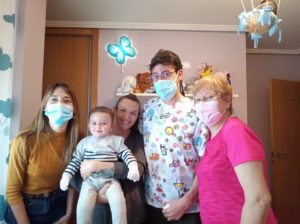At DEBRA we believe it is fundamental to be there to support families who have given birth to a baby with Butterfly Skin: to be there at their side, to help at this extremely challenging time and to ensure that all of the medical staff are fully up to date with the latest care procedures and treatments. We also know how important it is to visit families in their own home in more serious cases or simply where families need additional support. We visited 12 families between May and July of this year in places like Barcelona, Cuenca, Valladolid, Salamanca, Murcia, Seville and Tenerife. We visited new babies and supported a family through end of life, palliative care.
We also continue to see families at the Sant Joan de Deu hospital in Barcelona and the La Paz hospital in Madrid were the DEBRA team offer a comprehensive nursing, psychological support and social care service for patients.

BORN WITH BUTTERFLY SKIN
Throughout this period we visited 5 babies to support families who have just had a baby with Butterfly Skin. This service is essential to helping families to learn how to care for their baby so as to minimise pain and further wound damage, as well as to support them emotionally in coming to terms with the reality of living with this condition and to offer our support and advice when it is needed most.
From a nursing point of view we were on site to train hospital staff and coordinate care plans and treatment with the local health centres, ensuring that everyone involved is up to date and we underlined the importance of nutrition and the benefits of a gastrostomy in patients with EB.
On an emotional and psychological level we were there to help with any uncertainty and fears and to underline that we are always here for our families. We shared the experiences of other families and gave advice on how to use family support.
Our social workers helped families to think about education and schooling and how DEBRA could help them to ensure that a child with EB can attend school safely with the right support system in place.



DEBRA AT HOME
We also visited 4 families to follow up on specific problems for patients and carers. In this case having monitored the different types of blistering and wounds we were able to advise on various types of wound care treatment to help with healing and in some of the more complicated cases we were able to offer alternative treatments.
As well as visiting a number of local health centres to improve the level of care offered to families we also made home visits alongside members of the Sant Joan de Deu nursing team and social workers.
We are also very conscious of the importance of having family to support and help with the difficulties they face on a daily basis. We work with families to encourage collaboration, understanding, moderation, negotiation and above all empathy.